Related Research Articles
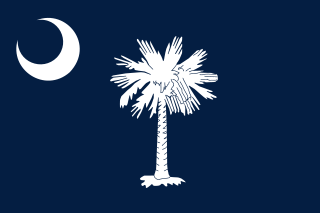
South Carolina is a state in the coastal Southeastern region of the United States. It is bordered to the north by North Carolina, to the southeast by the Atlantic Ocean, and to the southwest by Georgia across the Savannah River. South Carolina is the 40th most extensive and 23rd most populous U.S. state with a recorded population of 5,124,712 according to the 2020 census. In 2019, its GDP was $213.45 billion. South Carolina is composed of 46 counties. The capital is Columbia with a population of 133,273 in 2019; while its largest city is Charleston with a 2020 population of 150,277. The Greenville–Anderson–Mauldin metropolitan area is the most populous in the state, with a 2018 population estimate of 906,626.

Raleigh is the capital of the state of North Carolina and the seat of Wake County in the United States. It is the second-most populous city in North Carolina, the 41st-most populous city in the U.S., and the largest city of the Research Triangle metro area. Raleigh is known as the "City of Oaks" for its many oak trees, which line the streets in the heart of the city. The city covers a land area of 147.6 square miles (382 km2). The U.S. Census Bureau counted the city's population as 474,069 in 2020. It is one of the fastest-growing cities in the country. The city of Raleigh is named after Walter Raleigh, who established the lost Roanoke Colony in present-day Dare County.
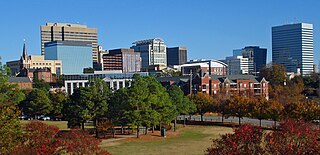
Columbia is the capital of the U.S. state of South Carolina. With a population of 136,632 as of the 2020 U.S. Census, it is the second-largest city in South Carolina. The city serves as the county seat of Richland County, and a portion of the city extends into neighboring Lexington County. It is the center of the Columbia metropolitan statistical area, which had a population of 829,470 and is the 72nd-largest metropolitan statistical area in the nation. The name Columbia is a poetic term used for the United States, derived from the name of Christopher Columbus, who explored for the Spanish Crown. Columbia is often abbreviated as Cola, leading to its nickname as "Soda City."
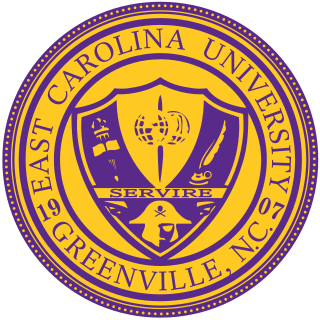
East Carolina University (ECU) is a public research university in Greenville, North Carolina. It is the fourth largest university in North Carolina.

Cullowhee is a census-designated place (CDP) in Jackson County, North Carolina, United States. It is located on the Tuckasegee River, and the permanent population was 6,228 as of the 2010 census.

Gaffney is a town in and the seat of Cherokee County, South Carolina, United States, in the Upstate region of South Carolina. Gaffney is known as the "Peach Capital of South Carolina". The population was 12,539 at the 2010 census, with an estimated population of 12,609 in 2019. It is the principal city of the Gaffney, South Carolina, Micropolitan Statistical Area, which includes all of Cherokee County and which is further included in the greater Greenville-Spartanburg-Anderson, South Carolina Combined Statistical Area.

Greenville is a city in and the seat of Greenville County, South Carolina, United States. With a population of 70,720 as of the 2020 Census, it is the sixth-largest city in the state. Greenville is located approximately halfway between Atlanta, Georgia and Charlotte, North Carolina along Interstate 85. Its metropolitan area also includes Interstates 185 and 385. Greenville was the fourth fastest-growing city in the United States between 2015 and 2016, according to the U.S. Census Bureau.
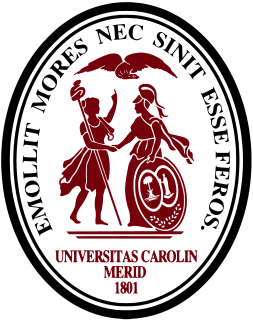
The University of South Carolina Aiken is a public university in Aiken, South Carolina. It is part of the University of South Carolina System and offers undergraduate degree programs as well as master's degrees. Additional graduate courses and degree programs are offered through the University of South Carolina Extended Graduate Campus program. The University of South Carolina Aiken awards baccalaureate degrees in more than 30 major areas of study include the bachelor of science in business administration online through Palmetto College.
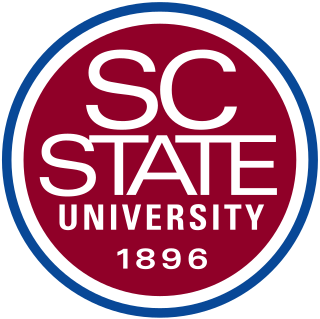
South Carolina State University is a public, historically black, land-grant university in Orangeburg, South Carolina, United States. It is the only public, historically black land-grant institution in South Carolina, is a member-school of the Thurgood Marshall College Fund, and is accredited by the Southern Association of Colleges and Schools (SACS).
The Darla Moore School of Business is the official business school of the University of South Carolina. Founded in 1919, the Moore School is located in Columbia, South Carolina and currently enrolls over 5,500 undergraduate and 800 graduate students in degree-seeking programs, including bachelor's, master's and doctorate degrees. The school is well known for its consistent high rankings in its program for international business.

The University of South Carolina Upstate is a public university in Valley Falls, South Carolina, near Spartanburg and with a Spartanburg postal address. Founded in 1967 and formerly known as University of South Carolina Spartanburg, the institution changed its name in the summer of 2004. It offers bachelor's and master's degrees for students in the Upstate and surrounding areas. It is part of the University of South Carolina System and home to approximately 6,000 students and 340 full-time faculty. It is accredited by the Southern Association of Colleges and Schools.
Francis Marion University is a public university near Florence, South Carolina. It is named in honor of American Revolutionary War Brigadier General Francis Marion.

Anderson University is a private university in Anderson, South Carolina. It offers bachelor's, master's, and doctoral degrees in approximately 78 areas of study. Anderson is affiliated with the South Carolina Baptist Convention and is accredited by the Commission on Colleges of the Southern Association of Colleges and Schools. Anderson participates in NCAA Division II athletics and is a member of the South Atlantic Conference.

Coastal Carolina University is a public university in Conway, South Carolina, in the Myrtle Beach metropolitan area. Founded in 1954, it became an independent university in 1993.

Philip Lader, the former US Ambassador to the Court of St. James’s, was Chairman of WPP plc, the global advertising/communications services firm.

Pfeiffer University is a private university in Misenheimer, North Carolina. It is affiliated with the United Methodist Church.

Henry Dargan McMaster is an American politician and attorney who has served as the 117th governor of South Carolina since January 24, 2017. He is a member of the Republican Party.
Piggly Wiggly Carolina Co. was a franchise of the Piggly Wiggly chain of supermarkets, based in South Carolina in the United States. The company entered a process of disposal of assets and dissolution in 2014.
Bobby J. Cox is a lieutenant colonel in the United States Army Reserve and a member of the South Carolina House of Representatives where he has represented the 21st District since 2019. He is a member of the Republican Party and a former Army Ranger.

The COVID-19 pandemic was confirmed to have reached the U.S. state of South Carolina in March 2020. On April 2, 2020, DHEC announced that the virus had spread to all 46 counties in the state. During the month of June the seven-day moving average of new COVID-19 cases in South Carolina increased nearly five-fold, from 293 on June 1 to 1,398 on June 30, and continued to increase during July and into August. As of March 11, 2022 the South Carolina Department of Health and Environmental Control (DHEC) has confirmed 1,150,425 cases in the state and 17,372 deaths.
References
- ↑ "South Carolina Business Schools". Small Business Notes. Retrieved May 7, 2016.